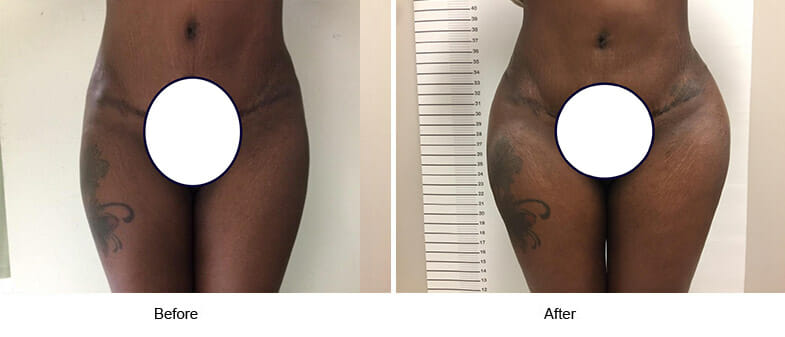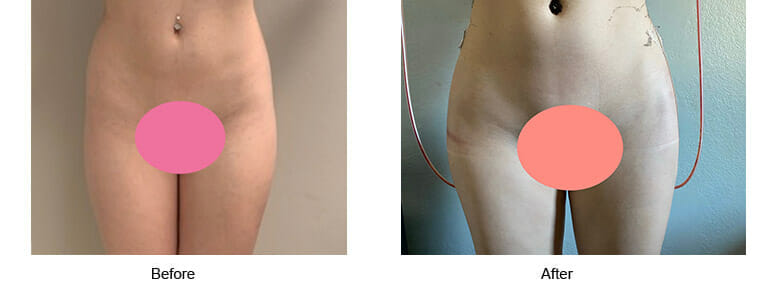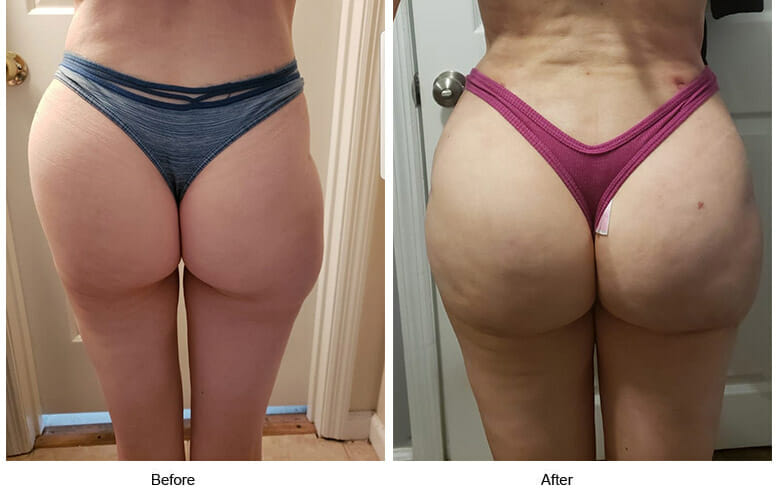- About Hip Dips Surgery
- Why Choose Hip Augmentation Surgery
- Before & After
- Are You a Hip Augmentation Surgery Candidate?
- What to Expect During Your Hip Augmentation Consultation
- What Happens During a Hip Augmentation Procedure
- What to Expect After Your Hip Augmentation Procedure & the Recovery Process
- FAQs About Hip Augmentation
Hip Dips Surgery Procedure
Many women are extremely self-conscious about their bodies. That hip augmentation lack of confidence permeates many areas of their lives. The thigh/hip area is very difficult to sculpt through diet and exercise, so many of these women have simply given up. Still, other women are transgender and crave the feminine figure that nature denied them. Finally, a growing number of our patients undergo these procedures for reconstructive purposes.
Lots of women also have concerns about hip dips. These indentations appear on the outer thigh. The trochanteric depression contains essentially no muscle, so it is always flat. Hip dips are especially pronounced if the woman has gained some weight. Her abdominal weight will accentuate the appearance of hip dips. Genetics plays a role here as well. Some female bodies are just different from other ones and no amount of diet or exercise will change them.
Every year, thousands of women in situations like these take control of their anatomical situations. They reached out to Double Board Certified Dr. Shahin Javaheri. He has over two decades of experience in this area. Perhaps more importantly, he fully understands that diet and exercise have their limits and that anyone can feel self-conscious about any area of the body.
Why Choose Hip Augmentation Surgery?
Dr. Javaheri likes to say that plastic surgery transforms individuals from the outside to the inside. Our website features numerous testimonials from people just like you that have experienced the transformative powers of plastic surgery.
Any sculpting or reconstructive procedure represents a significant investment of time and treasure. It’s important that patients seek out these procedures only for themselves. Looking like Kim Kardashian may not be the best reason to undergo a hip implant procedure, particularly over the long term.
Before & After Hip Dips Surgery Photos

Before & After Hip Dips Surgery


Are You a Hip Augmentation Surgery Candidate?
During your initial consultation, Dr. Javaheri will ensure that you are a good candidate for hip augmentation, both physically and mentally.
The procedure is invasive and involves anesthesia. So, the patient must be in good overall health and not have any known issues with anesthesia. Problems in this area do not necessarily derail procedures like hip augmentation or other body implants. We routinely work with patients who need accommodations of one kind or another.
Mentally, the patient must have reasonable expectations about the results and, as mentioned above, have the proper motivation to undergo hip augmentation. If the patient is not mentally prepared, for whatever reason, the results will almost always be disappointing.
What to Expect During Your Hip Augmentation Consultation?
Every patient is different, so every consultation is different. However, most of these meetings touch on the same three areas.
First and foremost, Dr. Javaheri will listen to your concerns about your body. Our caring and professional staff takes as much time as necessary to understand your motivations for seeking hip augmentation. This exchange builds a foundation for a long-term relationship.
Moreover, many women are concerned about the cost. As mentioned, plastic surgery is much more than a “cosmetic” procedure. It permeates every area of the patient’s life. Yet most health insurance companies do not see things that way. The cost varies significantly depending on the patient and the type of procedure. Furthermore, financing is available if needed.
Finally, Dr. Javaheri will go over the procedure itself as well as any post-surgical precautions. We never keep you in the dark about any aspect of your procedure.
What Happens During a Hip Augmentation Procedure?
Many women prefer natural-looking hip implants. These soft silicone implants look and feel like muscle. They are not filled with liquid, so they are very strong and will never leak. Instead, they are solid, much like the implants used in gluteal or buttock augmentation.
Once the patient is gently anesthetized (a local anesthetic is usually sufficient), Dr. Javaheri makes a small incision and inserts the implant underneath one of the hip muscles. The implant may be small, but it effectively reshapes the entire hip and pelvis area.
Other procedures involve fat transfer, which usually involves liposuction. This procedure is usually the exclusive remedy for hip dips. Dr. Javaheri siphons fat from one area of the body and strategically injects it into the hips. Fat transfer is not nearly as invasive as hip implants. Furthermore, fat transfer has the added bonus of slimming other areas of the body. This change makes the hip augmentation even more pronounced.
What to Expect After Your Hip Augmentation Procedure & the Recovery Process?
Recovery time is usually between six and eight weeks. Obviously, it takes less time to recuperate from fat transfer than hip implants.
For at least the first third of this time, many patients must lie still on their backs or stomachs. Otherwise, the hip/butt area will not heal properly. It’s normally okay to move around a little during the second third. During the home stretch, some daily activities are usually possible.
Like all surgical procedures, hip augmentation involves some risks. These risks are usually quite remote, and Dr. Javaheri will thoroughly review them all with you. Some common side effects include prolonged swelling or discomfort. These side effects are usually mild and Dr. Javaheri can prescribe medication as needed. Other much less common side effects include seroma (fluid buildup), fat necrosis (dead fat cells), and uneven scarring.
During your follow-up visits, our staff is very adept at spotting the early signs of side effects. In the unlikely event they occur, we help you deal with them.
FAQs
What is hip augmentation?
Hip augmentation is cosmetic surgery to enhance the hips using customized hip implants or fat grafting. Book a consultation with double board certified Dr. Shahin Javaheri to find out you’re a good candidate for to achieve sculpted, more defined hips.
How much does hip augmentation cost in San Francisco CA?
Costs for hip augmentation vary from patient to patient. It all depends on your specific needs and goals, whether implants or fat grafting is necessary, the expertise of your surgeon, and the complexity of your surgery. Schedule an appointment with a board-certified plastic surgeon Dr. Shahin Javaheri to learn about your options.
How long does it take to recover from hip augmentation?
Please follow post-operation care instructions for the fastest recovery time. Schedule two to three weeks of downtime for your recovery. Depending on how your body heals, you may need up to six weeks. A full recovery can take up to twelve weeks. Dr. Javaheri remains in contact with his patients throughout their recovery process to ensure the smoothest recovery. Schedule your consultation today to address your questions and concerns.
How long does hip dip surgery last?
There are different solutions for hip dip surgery and each solution produces results that last varying lengths of time. Fat grafting is a short-term solution compared to implants. With fat grafting, weight fluctuation after your procedure could affect the results of surgery. Implants, on the other hand, are a permanent solution except when complications arise requiring the removal or repositioning of implants.
What surgery gets rid of hip dips?
Hip dips require fat redistribution; injecting and/or removing fat from the hip and thigh areas to create smooth curves. Artificial fillers and silicone implants are other alternatives.
What is hip enhancement?
Hip enhancement is accentuating the natural curves of the hips. Procedures may include fat grafting or the use of implants.
Can you get surgery for hip dips?
Yes, and there are several procedure options to choose from. Hip dips can be resolved by fat redistribution, artificial fillers, or silicone implants. Talk to double-board-certified surgeon Dr. Shahin Javaheri to find the best solution for your specific goals.
Is hip dip surgery permanent?
Hip dip surgery can be permanent if you’re a candidate for silicone implants. Otherwise, fat grafting and artificial fillers are short-term solutions for you to consider. Schedule a consultation with Dr. Shahin Javaheri to find the best solution for your unique needs.
Where to get hip dip surgery in San Francisco?
Research surgeons in your area and schedule a consultation to find a surgeon that you are comfortable with. Look for board certification and experience in the surgery procedure you are seeking. When your questions are answered and you leave the clinic feeling assured, you are in good hands. Contact Dr. Shahin Javaheri’s office to schedule your consultation and see if we are the right fit for you!
Schedule Your Hip Augmentation (Hip Dips Surgery) Consultation Today!
To see if Hip Augmentation is right for you, contact Double Board Certified Dr. Shahin Javaheri for your initial appointment. You are welcome to visit our spacious San Francisco office, or you may choose a Skype or FaceTime consultation.
*Results for each patient will vary. Please remember that the information provided will not guarantee your eligibility. Consultation and medical examination must be completed before approval.



